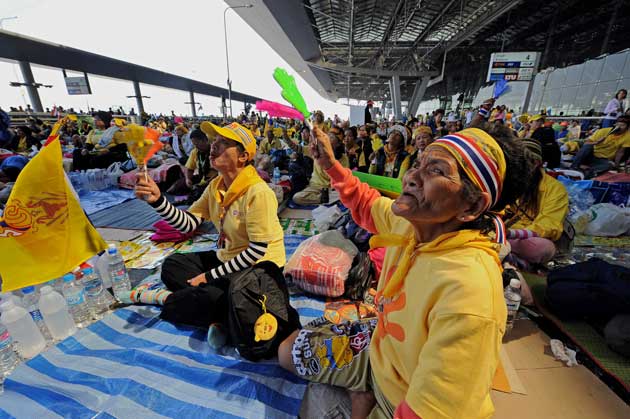Thai protesters overrun airport blockades
More than 100,000 tourists still stranded as the country remains paralysed by five-day siege. Oliver Wright reports from Bangkok

Your support helps us to tell the story
From reproductive rights to climate change to Big Tech, The Independent is on the ground when the story is developing. Whether it's investigating the financials of Elon Musk's pro-Trump PAC or producing our latest documentary, 'The A Word', which shines a light on the American women fighting for reproductive rights, we know how important it is to parse out the facts from the messaging.
At such a critical moment in US history, we need reporters on the ground. Your donation allows us to keep sending journalists to speak to both sides of the story.
The Independent is trusted by Americans across the entire political spectrum. And unlike many other quality news outlets, we choose not to lock Americans out of our reporting and analysis with paywalls. We believe quality journalism should be available to everyone, paid for by those who can afford it.
Your support makes all the difference.Hundreds of protesters occupying Bangkok's main airport yesterday stormed a police blockade, forcing 150 officers to flee a checkpoint as tensions mounted in the five-day stand-off that has virtually paralysed Thailand. Anti-government demonstrators armed with metal bars, baseball bats and golf clubs overran the cordon around the airport's perimeter, letting down the tyres of four police vans.
In the city itself last night, a grenade was lobbed into a rally of protesters occupying the compound at Government House, injuring 46 people. Suriyasai Katasila, leader of the People's Alliance for Democracy (PAD), the movement behind the protests, blamed government supporters. "I had come down from the stage about 30 minutes before the grenade dropped into a crowded area," he told Taiwanese television.
As protesters fought with the security forces outside the airport, one policeman was grabbed, forcibly put in a vehicle by three of the protesters, and driven away towards an area controlled by the demonstrators. It was unclear whether they intended to hold him hostage.
After the confrontation, about 500 more protesters arrived at the airport in a convoy of trucks. "If they enter the airport, we won't open the door for sure," said a protest leader. "If they enter and fire, we will fire back for sure. If we must die, then we will die."
Later, about 2,000 policeman were deployed for the first time around the main exit and entry points to the airport, raising fears among the protesters inside that they intended to clear the airport by force. One checkpoint on the main road leading to Suvarnabhumi airport, on the outskirts of Bangkok, was manned by about 400 policemen accompanied by 20 navy personnel armed with M-16 rifles. The roadblocks, police said, were meant to prevent more protesters from joining the thousands already inside the terminal building.
The confrontation has taken a heavy toll on Thailand's economy and reputation. Some 100,000 tourists, more than 3,000 of them British, are stranded, while many more who planned to go on holiday to the country cannot get in. Thailand's airport authority said yesterday that Suvarnabhumi would not reopen before tomorrow at the earliest. Some airlines are operating rescue flights out of an old navy base, 90 miles south of Bangkok, to ferry stranded passengers to Malaysia and Singapore. However, this has limited capacity and it would take weeks to move all the trapped passengers. Both the European Union and the US urged protesters to vacate the airports, saying the protests were "seriously damaging" Thailand's image.
The PAD is seeking the overthrow of the current Thai government led by Prime Minister Somchai Wongsawat. Mr Somchai, who is the brother-in-law of the former prime minister Thaksin Shinawatra, was elected last December after a military coup in 2006 ousted Mr Thaksin.
But despite PAD's name and its allegation that the government is a puppet of Mr Thaksin, more democracy is not what it seeks. It wants to change Thailand's constitution to reduce the democratic representation of Thailand's poor, the main backers of the ruling People's Power Party (PPP), and increase the number of appointments to parliament.
The group has the backing of powerful forces within Thailand that are upset by what democracy has brought to the country in the shape of Mr Thaksin and his rural backers. Senior army leaders are also broadly sympathetic to PAD, and the group has backers in the royal household. The police, on the other hand, are generally loyal to the government but it is unclear even here how wide the Prime Minister's writ runs. On Friday, he was forced to demote the national police chief for failing to take strong enough action against protesters, and Mr Somchai himself has been unable to return to the capital from the party's northern stronghold of Chiang Mai since the crisis began on Tuesday. But the PAD may have overplayed its hand. Holding Bangkok's new £2.6bn airport hostage is risky because it alienates the business community, its core backer.
Even if PAD wins and there is a military coup that ousts Mr Somchai and the PPP, the crisis is far from over. The PPP could unleash its own mass movement, the United Front of Democracy Against Dictatorship (UDD), to confront the PAD – but with similar or even bloodier results.
"We are calling for our supporters nationwide to come out," said Viphutalaeng Pattanaphumethai, a leader of the group. "They have been told to bring their clothes and food because we will be here for a long time."
Join our commenting forum
Join thought-provoking conversations, follow other Independent readers and see their replies
Comments